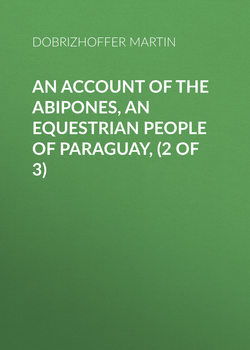Читать книгу An Account of the Abipones, an Equestrian People of Paraguay, (2 of 3) - Dobrizhoffer Martin - Страница 11
CHAPTER XI.
OF THE DIVISION OF THE ABIPONIAN NATION, OF THEIR PAUCITY, AND OF THE CHIEF CAUSES THEREOF
ОглавлениеTo look for policy in savages will appear to you like seeking a knot in a bulrush, or expecting water from a flint. The Abipones, a nation obstinately attached to their ancient liberty, lived at their own pleasure, impatient of all controul. Their own will was their sole law. Nevertheless, as bees, ants, and every kind of animal, by natural instinct, observe certain peculiarities of their species, in like manner the most ferocious Indians pertinaciously retain, even to this day, certain customs, the ordinances of their nation, handed down to them by their ancestors, and regarded by them as laws. I shall proceed to treat of the political, economical, and military regulations of the Abipones, of their customs and magistrates.
The whole nation of the Abipones is divided into three classes: the Riikahès, who inhabit extensive plains; the Nakaigetergehes, who love the lurking-holes of the woods; and lastly, the Yaaucanigas, who were formerly a distinct nation, and used a separate language. In the last century, the Spaniards, whom they had gone out to slaughter, surprized them by the way, and almost destroyed them all. A few who survived the massacre, with the widows and children of the slain, joined the neighbouring Abipones, and both nations, by inter-marriages, coalesced into one; the old language of the Yaaucanigas falling into disuse. The Abiponian tribes pursue the same manner of life, and their customs and language, with the exception of a few words, are alike. Wondrous unanimity, and a constant alliance in arms, reigned amongst them as long as they had to deal with the Spaniards, against whom, as against a mutual foe, they bear an innate hatred, and whose servitude they resist with united strength. But though bound by the ties of consanguinity and friendship, impatient of the smallest injury, they eagerly seize on any occasion of war, and frequently weaken each other with mutual slaughter.
Like the other American savages, some of the Abipones practise polygamy and divorce. Yet they are by no means numerous; the whole nation consisting of no more than five thousand people. Intestine skirmishes, excursions against the enemy, the deadly contagion of the measles and small-pox, and the cruelty of the mothers towards their offspring, have combined to render their number so small. Now learn the cause of this inhumanity in the women. The mothers suckle their children for three years, during which time they have no conjugal intercourse with their husbands, who, tired of this long delay, often marry another wife. The women, therefore, kill their unborn babes through fear of repudiation, sometimes getting rid of them by violent arts, without waiting for their birth. Afraid of being widows in the life-time of their husbands, they blush not to become more savage than tigresses. Mothers spare their female offspring more frequently than the males, because the sons, when grown up, are obliged to purchase a wife, whereas daughters, at an age to be married, may be sold to the bridegroom at almost any price.
From all this you may easily guess that the Abiponian nations abound more in women than in men, both because female infants are seldomer killed by their mothers, because the women never fall in battle as is the case with the men, and because women are naturally longer lived than men. Many writers make the mistake of attributing the present scanty population of America to the cruelty of the Spaniards, when they should rather accuse that of the infanticide mothers. We, who have grown old amongst the Abipones, should pronounce her a singularly good woman who brings up two or three sons. But the whole Abiponian nation contains so few such mothers, that their names might all be inscribed on a ring. I have known some who killed all the children they bore, no one either preventing or avenging these murders. Such is the impunity with which crimes are committed when they become common, as if custom could excuse their impiety. The mothers bewail their children, who die of a disease, with sincere tears; yet they dash their new-born babes against the ground, or destroy them in some other way, with calm countenances. Europeans will scarce believe that such affection for their dead children can co-exist with such cruelty towards them while they are alive, but to us it is certain and indubitable. After our instructions, however, had engrafted a reverence for the divine law in the minds of the Abipones, the barbarity of the mothers gradually disappeared, and husbands, with joyful eyes, beheld their hands no longer stained with the blood of their offspring, but their arms laden with those dear pledges. These are the fruits and the triumphs of religion, which fills not only Heaven but earth with inhabitants. When polygamy and divorce, the iniquitous murdering of infants, and the liberty of spontaneous abortion were at length, by means of Christian discipline, abolished, the nation of the Abipones, within a few years, rejoiced to see itself enriched with incredible accessions of both sexes.
